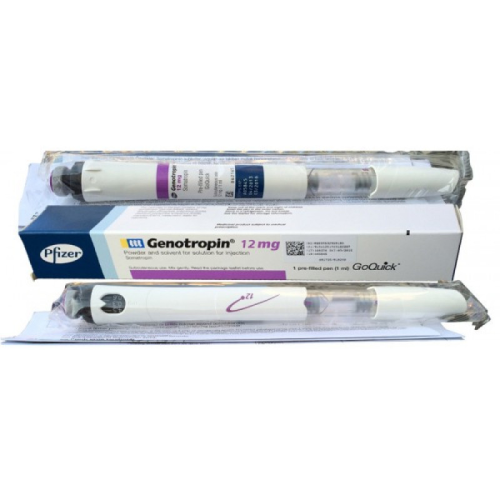Genotropin 36 IU (12 MG) GoQuick
- Brand: Pfizer
- Product Code: Genotropin 36 IU (12 MG) GoQuick
- Availability: In Stock
-
$320.00
ACTIVE HALF-LIFE
2.5-3 hours
CLASSIFICATION
Peptide Hormone
DOSAGE
Men 4-10 IU/day
ACNE
No
WATER RETENTION
No
HBR
No
HEPATOTOXICITY
No
AROMATIZATION
No
MANUFACTURER
Pfizer
LAB TEST
See Document
WAREHOUSE
International Warehouse 2
SUBSTANCE
Somatropine - 191 Amino Acid
,
Human Growth Hormone (HGH), also referred to as somatotropin or somatropin, is a peptide hormone that promotes growth, cellular reproduction, and regeneration in humans and other species. It acts as a mitogen specifically targeting certain cell types. HGH consists of a single-chain polypeptide made up of 191 amino acids, produced, stored, and released by somatotropic cells in the lateral wings of the anterior pituitary gland. Its secretion is influenced by various factors, notably nutrition and physical activity.
HGH encourages the enlargement of body cells and accelerates cell division. Furthermore, it facilitates the movement of amino acids across cell membranes and speeds up the conversion of these amino acids into proteins, contributing to an anabolic effect that promotes muscle growth. Additionally, HGH can reduce the rate at which cells utilize carbohydrates while increasing fat utilization. Administration of HGH at doses as low as 0.028 iu/kg per day for 24 weeks has been linked to fat loss and muscle mass gains and also stimulates the production of Insulin-like Growth Factor 1 (IGF-1).
In medical practice, HGH is prescribed to manage growth disorders in children and to treat adult growth hormone deficiency. Research has consistently shown a range of positive effects associated with HGH modulation, including:
Several studies, primarily involving individuals with HGH deficiency, have highlighted HGH's significant role in mental and emotional health, as well as in sustaining high energy levels. Adults with HGH deficiency tend to experience higher rates of depression compared to those without.
Research has also examined the relationship between HGH and cognitive functions like learning and memory, with some evidence suggesting that HGH can improve cognitive function in those with deficiencies.
Since at least 1982, HGH has been misused by athletes to enhance performance. While HGH can effectively contribute to muscle and weight gains, it is less effective for increasing strength. Athletes from the 1970s and particularly the 1980s began to showcase more defined physiques reminiscent of classical sculptures, likely without incorporating significant cardio or increasing their protein intake.
HGH typically demonstrates enhanced effects when combined with a steroid cycle, making it more effective for achieving lean muscle and fat loss during cutting phases than when used on its own.

